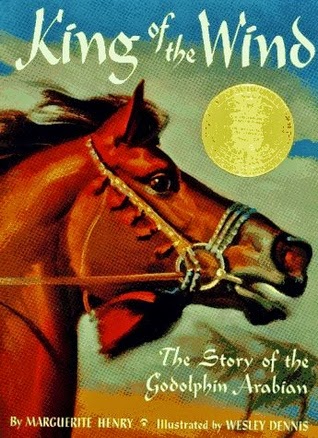ALRIGHT already. I'm on my third Marguerite Henry book for this blog and I'm eating a hearty portion of crow for having disliked her books and refusing to read them in grade school. The only reason I can think of is that when they were recommended to me, I didn't feel like they were really being recommended based on what the teacher knew of me and what I liked. Rather, it was more of a "You're a girl, girls like horses, here you go" sort of reasoning. Except I never really had a horse thing. But I would have still liked the books.
The story of the horse in question begins in Morocco. A mute boy named Agba, who works tending horses in the Sultan's stables, is present when his favorite mare gives birth to a new foal. The golden coat of the foal inspires Agba to name him Sham, the Arabic word for "sun". Sham's mother does not survive for long after his birth, and it is assumed that Sham will soon follow. No one is especially concerned about this since he's small and has a pattern of hair on his chest that signifies bad luck. But as Agba notices, he also has a marking that signifies swiftness. Agba hopes that the good marking will overpower the bad, and is able to nourish the horse to health with camel's milk.
Sham grew until he was the swiftest horse in the Sultan's stables. Agba is constantly caring for him, a substitute for the mother he lost. One day, Agba and five other stable boys are bathed and prepared to meet the Sultan. The Sultan wants the six best stallions from his stables, one of each color, to be selected. Each boy will be responsible for one horse, and the entire party will be sent by boat to Versailles as a gift to Louis XV, the boy king of France. Each horse bears a document describing its pedigree stretching back to the horses of Mohammed himself, as well as stones and amulets intended to ward off sickness and injury. The boys are to remain with the horses and care for them as long as the horse lives before returning to Morocco. The Sultan is hoping that such a lavish gift will make the kind look favorably upon him.
What the Sultan does not know is that the ship's captain kept the money intended for rich foods for his passengers and stocked hay for the voyage instead. When they finally arrive at Versailles, horses and boys alike are emaciated and in poor condition. The king and his officials laugh at such a gift, and sends them away from the stables to be sold for other purposes. Here begins Sham's journey through multiple owners and households, some kind, others abusive. Agba refuses to leave the horse, and is the only person Sham will gladly cooperate with. Sham eventually does find his way to a kind owner who discovers his true potential (and that of his offspring).
So, without giving all of the details away, another great horse book.
Subscribe to:
Post Comments (Atom)

No comments:
Post a Comment